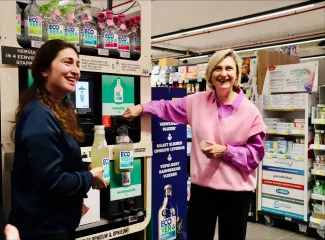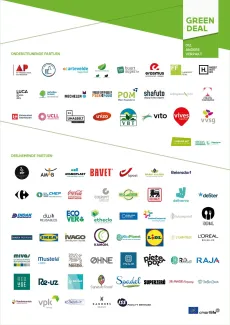Green Deal Anders Verpakt: for 15,000 tons less disposable packaging in Flanders
Today, Flemish ministers Hilde Crevits and Zuhal Demir signed the Green Deal Anders Verpakt (packaged differently) in Hasselt, together with more than 80 leading companies and organisations. Dirk Fransaer, Managing Director of VITO, also signed.

This Green Deal is an initiative of OVAM, the spearhead cluster VIL, COMEOS, Detic and Fevia Vlaanderen. Together with all participants, they will spend the next three years looking for solutions to stimulate the prevention and reuse of packaging in the distribution sector.
The ambition is to reduce the amount of disposable packaging by 15,000 tons (equivalent to 300 million units) in the distribution sector with over 80 projects. This concerns, for example, alternatives to bottles of care products or plastic and cardboard boxes containing food or furniture that are only used once and then end up in the rubbish bin.
The projects within the Green Deal give consumers in shops more choice to avoid buying single-use packaging and to opt for products that are packaged 'differently'.

Why this Green Deal?
More and more single-use packaging is coming onto the market. In the last 10 years, the amount of household disposable packaging increased by 10%. The total weight of single-use packaging for consumer goods was estimated at over 900,000 tons per year in Belgium in 2019.
"Today we are joining forces to reduce this mountain of waste. The transition to a circular economy is one of the top priorities within Flemish policy," explains Flemish Minister of Economy and Innovation Hilde Crevits. "The entire chain is involved: from suppliers and shops to experts in circular products.The social aspect of this Green Deal is not unimportant either: the projects offer extra work in the social economy. For example, tailor-made company Mivas focuses on cleaning, quality control and refilling of packaging."
Prevention and reuse central
In a circular economy, material cycles are closed as much as possible to avoid the use of primary raw materials and to reuse materials and products for as long as possible.
"Recycling is good, but reusing or even leaving out packaging completely is better", says Flemish Minister of the Environment Zuhal Demir. "Today we are already the European leader in recycling. With this Green Deal, we want to reinforce our ambition to play an exemplary role in reuse as well. Together with various leading companies, we want to convince consumers to disregard single-use packaging and switch to reusable alternatives. In this way, we can significantly reduce our waste mountain. Not only the environment will benefit, but so will our wallets," Demir says.
Need for new solutions
Because single-use packaging is often developed for a specific product, it is not always easy to change this packaging to a reusable alternative or to get rid of it altogether. This often requires rethinking the entire business model. There are uncertainties regarding the effective reduction of the environmental impact, customer acceptance, financial consequences for the company, additional workload, consequences for product protection and quality, and so on.
Nevertheless, there are examples that show it can be done and there is an increasing ambition within the distribution chain to make packaging more sustainable. By cooperating with knowledge centres and pioneering companies, this Green Deal should offer the participating companies an answer to their pertinent questions regarding the prevention and reuse of packaging. Together, we are looking for solutions that will reduce the environmental impact of packaged goods. The concrete projects put theory into practice.
Together for a smaller waste mountain with innovative solutions
Prior to the signing of this Green Deal, ministers Crevits and Demir visited the Delhaize store AD Quartier Bleu in Hasselt. At the beginning of February, Delhaize and Ecover installed refilling stations for a series of Ecover products there as part of this Green Deal. These refilling stations have already been trialled in two shops in Flanders (Kessel-Lo and Sint-Katelijne-Waver), but Ecover is rolling out the project further together with Delhaize as part of the Green Deal.
Tom Domen explains why Ecover is taking this step: "At Ecover, we believe that reuse is the new recycling. It redefines the ambition for a truly circular economy. We have set the challenge of making reuse the new standard for everyday shopping behaviour."
With the refill stations, they are helping customers to reduce their plastic consumption and reuse packaging. And it's very simple: customers bring their empty bottle to the shop, refill it, take a ticket or scan a code and pay for their full bottle at the checkout. That bottle also costs them about 10% less.
Ilya Van Den Borre from Delhaize is enthusiastic about the cooperation: "As part of our sustainability programme The Lion's Footprint, we at Delhaize have been fighting for a long time to make packaging more environmentally friendly. Signing this Green Deal Anders Verpakt is another step in the right direction. Only by working together can we increase our efforts and effectively create impact. We are excited to work with Ecover to install refill stations in our supermarkets to reuse packaging."




